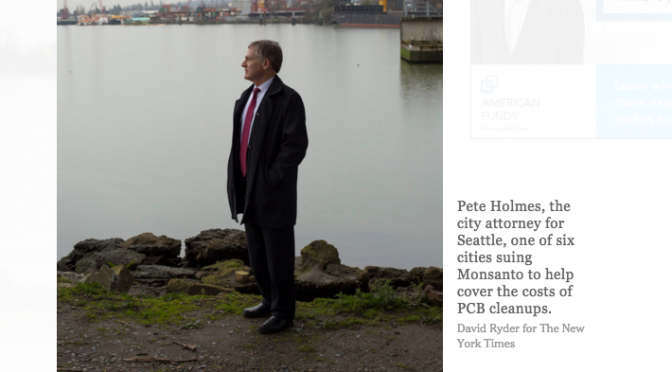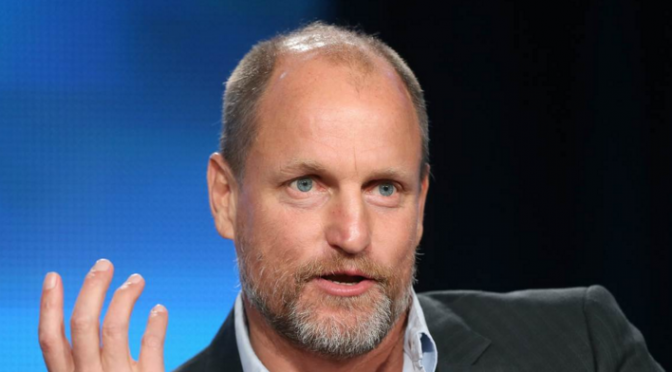WASHINGTON — Facing hundreds of millions of dollars in lawsuits, the giant biotechnology companyMonsanto last year received a legislative gift from the House of Representatives, a one-paragraph addition to a sweeping chemical safety bill that could help shield it from legal liability for a toxic chemical only it made.
Monsanto insists it did not ask for the addition. House aides deny it is a gift at all. But the provision would benefitthe only manufacturer in the United States of now-banned polychlorinated biphenyls, chemicals known as PCBs, a mainstay of Monsanto sales for decades. The PCB provision is one of several sticking points that negotiators must finesse before Congress can pass a law to revamp the way thousands of chemicals are regulated in the United States.
“Call me a dreamer, but I wish for a Congress that would help cities with their homeless crises instead of protecting multinational corporations that poison our environment,” said Pete Holmes, the city attorney for Seattle, one of six cities suing Monsanto to help cover the costs of reducing PCB discharge from their sewers.
The House and the Senate last year both passed versions of legislation to replace the 40-year-old Toxic Substances Control Act, a law that theEnvironmental Protection Agency acknowledged had become so unworkable that as many as 1,000 hazardous chemicals still on sale today needed to be evaluated to see if they should be banned or restricted.
Democrats and Republicans—along with the chemical industry and even some environmentalists—agree that the pending legislation would be a major improvement over existing law.But from legal liability shields to state-based regulatory authority, the House and Senate versions have major differences to resolve. The remaining disputes revolve around the basics of pre-emption: Who gets to sue? Andwho gets to regulate the chemical industry?
A Monsanto spokeswoman said the company had received no special treatment from the House or the Senate.
“Monsanto does not consider either version of the bill, with respect to the effect on preemption, to be a ‘gift,’ ” the spokeswoman, Charla Lord, said.
Already, attorneys general and top environmental regulators from 15 states have written to leaders in Congress demanding changes.
“Our future work depends on striking the right balance to strengthen the U.S. Environmental Protection Agency’s abilities and funding, without limiting state powers in creating and enforcing needed protections,” said aletter, obtained by The New York Times, sent by the top environmental regulators in California, Connecticut, Minnesota, New Hampshire, New York, Oregon, Washington and West Virginia.

Some of the most vociferous objections relate to the so-called Monsanto Clause. The provision does not mention the company by name, but between the early 1930s and 1977, Monsanto manufactured almost all of the 1.25 billion pounds of PCBs sold in the United States.
The chemicals were initially admired for their ability to prevent fires and explosions in electrical transformers and other equipment. But as the use of PCBs skyrocketed nationwide in products as varied as paints, pesticides and even carbonless copy paper, evidence mounted that they were contaminating the environment and potentially causing health problemsincluding cancer and immune-system complications. The E.P.A. banned their production in 1979.
PCB litigation has surged in the last year as cities and school systems struggle to comply with directives from federal and state regulators to reduce PCB levels in sewer discharge and in caulk once used to construct schools. Separately, a group of individuals who received diagnoses of a form of cancer known as non-Hodgkin’s lymphoma sued Monsanto last year, claiming the company should pay damages.
The Senate Environment and Public Works Committee, in a June reportaccompanying its version of the legislation, asserted that neither existing toxic chemical law nor any revisions pending in Congress should be seen as a way to “pre-empt, displace or supplant” the right to sue for damages in lawsuits like the ones filed against Monsanto.
The House also voted to preserve the right to sue if individuals or local governments believe they have been harmed by a chemical, regardless of future federal regulations of the substance. But a critical paragraph added to the House bill in late May made sure past regulatory requirements by the E.P.A. would continue to disqualify legal claims, and it specifically referred to the section of the 1976 toxic chemical law governing PCBs, giving Monsanto clearer authority in the future to ask judges to dismiss lawsuits filed against it.
Congressional aides involved in the drafting said the language was inserted at the request of Republican staff members at the House Energy and Commerce Committee. One Republican committee aide disputed any suggestion that this was a gift to Monsanto, but he said he was not allowed to discuss the issue on the record.
And Ms. Lord, the Monsanto spokeswoman, said the company did not ask for the change.
Read Full Article – http://www.nytimes.com/2016/03/01/business/monsanto-could-benefit-from-a-chemical-safety-bill.html?_r=0





